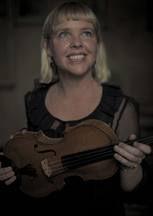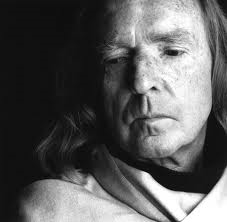Sydney violinist has the best of two worlds

Kirsty Hilton has the best of two very rarefied worlds. As well as being Co-Principal 2nd violin with the Sydney Symphony Orchestra, she is also a violinist and sole Australian representative with the Mahler Chamber Orchestra, based in Europe and which is soon to tour to Sydney, conducted by Daniel Harding. She has been performing with the MCO since 2000 and is eager to welcome the players to her home town of Sydney for the very first time.
Talking to SoundsLikeSydney earlier this month, she described her life as a violinist within two orchestral spheres. Born in Sydney, Kristy Hilton started studying the violin aged 5. She began to attend the Sydney Conservatorium of Music aged 7 moving to the Conservatorium High School under the tutelage of Alice Waten. Aged 20, she studied for a year at the Guildhall School of Music in London. Then came a 10 year stint in Germany, 4 of which were spent at the Berlin Philharmonic’s Karajan Academy, followed by a contract with the orchestra and work in Munich for 6 years before returning to Sydney.
Whilst playing with the MCO, Kirsty Hilton has performed under the baton of names that some of us might only see printed on a CD case – Abbado, Jansons, Haitink, Rattle and Ozawa.
“There is an energy to the MCO that is unique,” she says. “Just to watch them and hear their sound conveys the sense that they’re always totally committed. I always have a great time playing with them and the concerts will be great with soloists like Christian Tetzlaff (June 10th) and Alisa Weilerstein (June 11th). Tetzlaff’s performance of Beethoven’s Violin Concerto is really amazing and it’s fantastic to have someone like him in Sydney.”
In an interview with SoundsLikeSydney earlier this month, Weilerstein endearingly referred to the MCO as ‘the gypsy orchestra’ – an orchestra whose players are drawn from all over the world and which in fact has no home base or home state funding. The 45 core members of the orchestra come from 20 different nations and live all over Europe. In the 2012/13 season, the orchestra performs in 13 countries in Europe as well as in Japan and Australia,
Hilton observes “The MCO has no city or concert hall where it performs on a regular basis, and that’s one thing that makes it great when you come together. It is still different to touring with a company whose musicians are resident in one city. We’re constantly on tour and I think that’s part of the excitement that comes through in the playing.”
Hilton continues, explaining the logistics of the MCO: ” We meet to rehearse about 3 days before the first concert. All the players are in different cities, so wherever the tour starts is where we usually begin to rehearse. Despite the scatter and the fact that we don’t work together all year round, we do get close because we’re eating together and in the same accommodation and that allows us to build rapport outside of rehearsing. Some long standing players now have children whom they bring along on tour – that’s something new over the past 10 years. We do get to know each others’ playing styles and to work together as an ensemble. Many of them have played together since they were teenagers and have known each other a really long time.”
In that statement lie the origins of the Mahler Chamber Orchestra. Like the Bach Choir and Monteverdi Choir, the Mahler Chamber Orchestra is not defined by playing chamber music nor does it confine itself to the music of Mahler. In fact the repertoire they are bringing to Sydney, like Dvorák’s Symphony No.9 ‘From the New World’, requires substantial orchestral forces.
So why the anachronism in the ensemble’s title? The MCO grew from the Gustav Mahler JugendOrchester (GMJO), established in 1986 in Vienna, by Claudio Abbado, now music director of the MCO, and two colleagues. They wanted to foster emerging talent and to promote opportunities for young Austrian musicians to play with colleagues from the Eastern bloc nations. Open auditions, the calibre of the orchestra, the opportunities it offered and the fall of the Iron Curtain extended the orchestra’s reach and by 1992 musicians under the age of 26 from anywhere in Europe were able to audition to join.
Realising that turning 26 was not the end of the road for them as an ensemble, the graduates of the GMJO formed The Mahler Chamber Orchestra in 1997. The ensemble had its breakthrough in the summer of 1998, when they performed in a production of Mozart’s Don Giovanni under the direction of Abbado at the opera festival in Aix-en-Provence, proving that they are defined by neither Mahler nor chamber music.
In times when even ensembles with healthy state funding are struggling for funds, the MCO seems to have hit on the right formula. Hilton says “We have no government funding. Our income is mainly from the box office, with help from donations and sponsors. The orchestra’s travel and accommodation are expensive but on the other hand it’s nice to have an ensemble that works in a different way. We are our own organisation and we run it ourselves. Decisions are made democratically with the participation of all members. We have residencies which give us terrific support, like in Ferrrara, Italy and in the Northern Rhine region of Germany. Mr Abbado had strong relationships in Ferrara but the theatre was damaged in the earthquake. We did a benefit concert for the theatre there last year.”
As the only Australian in the ensemble, Hilton holds the dubious honour of having to travel the furthest to perform with the MCO. The lengthy travelling time to Europe from Sydney and her commitments at home mean that Hilton keeps her involvement with the MCO to the minimum requirement, which is around half of their annual programme.” There about 200 days of performances a year if you do all the concerts,” she says. ” I spend three months of the year with the MCO, spread over 4 trips.This is the opposite of what many of the others do because for them the MCO is their primary orchestra and they’re casual players in the orchestra of the city in which they live.”
Other repertoire for the MCO’s Sydney concerts includes Schumann’s Symphony No 3 Rhenish, Brett Dean’s Testament and the Sonata for strings by Henze. Hilton describes the core of the MCO’s work as being the of symphonic works and operas of the Viennese classical and early Romantic periods – Beethoven, Schumann and Mozart. They are often invited to perform at festivals and to premiere contemporary works. They performed a staged production of Wozzeck in 2010 and in 2012, gave the world premiere of George Benjamin’s Written on Skin at the Aix-en-Provence festival, conducted by the composer. Conducted by Daniel Harding, they will perform Schumann’s Second Symphony, Sibelius’s Seventh, and Mozart’s Piano Concerto No. 25 with Paul Lewis at the BBC Proms in London in late July.
True to their peripatetic style, the MCO has no permanent conductor at present, working instead with a range of regulars who include Abbado, Andris Nelson, Daniele Gatti and Esa-Pekka Salonen.
I asked Hilton what it was like returning to Sydney after living and working in Europe. ” It’s true that in Europe there is just so much more going on and there is more choice. Any tiny town in Germany has an orchestra. Munich has a city of 1 million but it has 7 orchestras and there is wide choice of music. Here, it is on a smaller scale but at a very high level. A lot of people leave Australia because they do want to have that experience of being in a place where music is everywhere. Australian trained musicians do well overseas. Every major orchestra in the world has at least one Australian.”
And there are advantages to not being steeped in heritage. “My impression from talking to conductors and soloists who have worked here and who aren’t Australian is that they love working with us because we are so open to trying new things and are not so set in our ways like the old European orchestras which have traditions that they’re reluctant to break.”
“We have the courage and imagination to put on bigger things and newer things, trusting that people want to hear it. We will take risks and not always play safe.”
Musical excellence apart, the MCO is spearheading an experiment in diversity, flexibility and self management which has thus far proved to be a winner in austere times.
Kirsty Hilton was interviewed by Shamistha de Soysa for SoundsLikeSydney©
The Mahler Chamber Orchestra performs at the Sydney Opera House on June 10th and 11th.
Click here for SoundsLikeSydney’s interview with cellist Alisa Weilerstein.
Click here for SoundsLikeSydney’s interview with Yarmila Alfonzetti, Producer of Classical Events at the Sydney Opera House.






